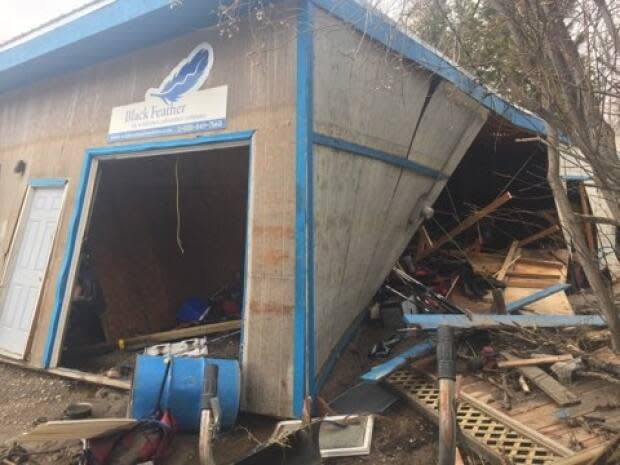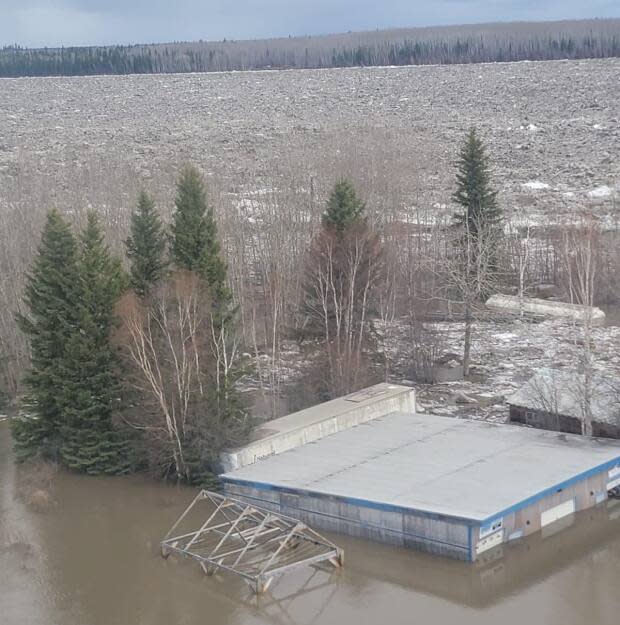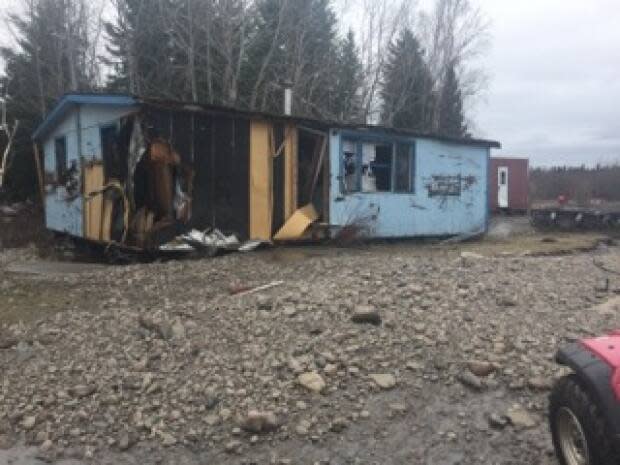Fort Simpson woman still struggling with disaster assistance program

Laverna Martel-Harvey has been working out of a cramped crew house since the devastating flood that swept through the Dehcho region of the Northwest Territories last year.
South Nahanni Airways' new office is being built in Calgary and is still a few months away from arriving in Fort Simpson, N.W.T.
Martel-Harvey owns the business with her husband Jacques Harvey, as well as Wolverine Air, and Airports North Ltd., which operates the airport on the island. She expected to pay for the new office with funds from the territory's Disaster Assistance Policy (DAP), but it may not be eligible for funding.
"[Government officials] haven't given me any proper answer as to why," she said.
It's the latest in a string of frustrations she said she's had with the DAP.
More pressing is the possibility of having to pay back all $300,000 she received after missing the government's deadline to submit paperwork for her claims.

Overall, 129 residences, 41 small businesses or non-governmental organizations and four community governments made claims. The N.W.T. government estimates the response and recovery for last year's flood to cost about $40 million.
Originally from Hay River, Martel-Harvey has been in touch with people in the community going through their own recovery.
"Don't be sitting there thinking that it's all going to be gravy because you're going to be getting [money]" she said. "It's not like that at all."
From bad to worse
Martel-Harvey said her businesses were already struggling due to the pandemic when the biggest flood in 60 years hit.
They lost several fuel tanks and vehicles, their office was damaged, their airport is still not fully restored, and "the list goes on and on," said Martel-Harvey.
Assessors determined the couple suffered about $2 million in damages across their three businesses.
In the spring, their staff usually doubles to about eight people; last year after the flood, there were no additional hires.

Instead, she and Jacques spent most of their time cleaning up.
"We had to go out and purchase a dump trailer," said Martel-Harvey. "Ninety trips to the dump."
The pair recouped some of the costs through the DAP, but Martel-Harvey said the process brought along additional headaches that weren't worth the effort for the amount of money they received.
"If I had to do it over again, I would have said, 'No, leave me alone. I don't need it.'"
Tight deadline
Last year's version of the DAP allowed for a maximum claim of $100,000 for residents and small businesses — an amount Martel-Harvey said they easily maxed out for all three businesses.
Usually, DAP claimants spend their own money on repairs and replacing lost items, and then apply for reimbursement. Martel-Harvey said she received the $100,000 for each business up front, with two-thirds of the money coming last November.
At that point, she had just over a month to file all the paperwork ahead of the Department of Municipal and Community Affairs (MACA)'s deadline of Dec. 31, meaning all work would need to be done or in progress by then.

"We can't refurbish, replace, rebuild, purchase everything in a short period of time," said Martel-Harvey. "That's not the season to be building."
She adds the department told her she should have bought the necessary materials anyway. "For what?" she asks. "To sit here and rot?"
And that's if the materials were even available. Last summer, the pandemic jammed global supply chains for everything from lumber to baby formula. Martel-Harvey said they contacted different suppliers only to be told things weren't in stock.
Labour is also hard to come by in the North, a situation made even worse by COVID-19 outbreaks. Martel-Harvey said they tried to get quotes from local contractors, but they were already backlogged with work.
Lorie Fyfe, assistant deputy minister of disaster assistance, said MACA heard from residents the December deadline was not enough time, and so it pushed it to Feb. 18.
But Jennifer Young, director of corporate affairs for MACA, said supply chain issues and a lack of labour didn't factor into determining the new deadline. Rather, the initial funding approved for flood recovery was running out at the end of the fiscal year in March.
Despite informing residents they risk being invoiced for their entire DAP amounts if they don't submit paperwork, MACA said it's still willing to work with them.

Young said the department still doesn't know how many residents may be invoiced for money that ultimately wasn't spent.
The territory doesn't have base funding to cover disaster costs. Instead, it's funded through Disaster Financial Assistance Arrangements with the federal government. Under that agreement, the territorial government has five years to submit its claim for reimbursement once an Order-in-Council is approved, which hasn't happened yet for last year's flood.
So residents had less than a year to complete their claims while the government still has five years to get its money back.
'Unbelievable'
In May, Martel-Harvey filed paperwork for the South Nahanni Airways and Wolverine Air claims.
The couple has managed to buy a few replacement fuel tanks and pumps, as well as covered trailers to bring some of their equipment with them if another flood were to happen. But none of these items are included in the claims.
Instead, Martel-Harvey said she submitted a single project for each: a float deck and the new office, each costing more than $100,000.
Earlier this year, Cabin Radio reported Wolverine Air was sued for not paying for the new float deck. Martel-Harvey disputes the cost but was ultimately ordered to pay.
According to Cabin Radio, the repair company said Wolverine's insurance company approved the repair. Martel-Harvey said she never received insurance money to pay for the deck, so has filed it as her DAP claim.
So far she hasn't heard whether her paperwork has been accepted. She was recently told MACA staff did not have time to look over it as they're dealing with the ongoing recovery in Hay River.
"I rush and work my butt off to get it to [them]," she said, "and now [they] don't even have time to look at it. Unbelievable."
For now, Martel-Harvey awaits her new office, whether she can pay for it, and if she will somehow owe the government money despite her businesses still not being back to pre-flood condition.


